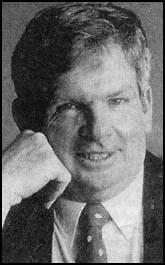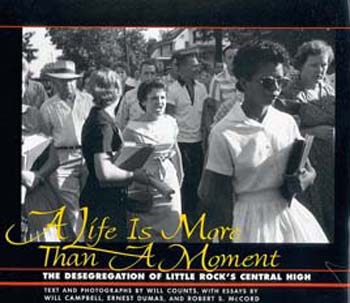Will Counts

Will Counts, the son of a tenant farmer, was born in Arkansas, on 24th August 1931. He attended the all-white Little Rock Central High School before going onto Arkansas Teachers' Training College in 1949. This was followed by a master's degree in education at Indiana University. After returning to Little Rock he trained in journalism and became a photographer for the Arkansas Democrat newspaper.
In 1954 the Supreme Court announced that separate schools were not equal and ruled that they were therefore unconstitutional. Some states accepted the ruling and began to desegregate. However, several states in the Deep South, including Arkansas, refused to accept the judgment of the court.
On 4th September, 1957, Elizabeth Eckford and eight other African American students attempted to enter Little Rock Central High School, a school that previously had only accepted white children. The governor of Arkansas, Orval Faubus, was determined to ensure that segregation did not take place and sent the National Guard to stop the children from entering the school.
Several national photographers were arrested trying to take photographs of the children going to school that morning. Counts, a local man, was allowed to carry on and it was his picture of the African American entering Little Rock Central High School that appeared in the world's newspapers. Count's pictures were nominated for the Pulitzer Prize but he only won the runner-up award.
In 1960 Counts joined the Associated Press in Chicago and three years later took charge of the photography programme at Indiana University, where he developed a course on photojournalism.
Will Counts, who retired in 1995, died on cancer on 6th October 2001.

on 4th September, 1957. The girl shouting is Hazel Massery.
Primary Sources
(1) Elizabeth Eckford was one of the nine African American students who tried to enroll at Little Rock Central High School during September, 1957. She was later interviewed about her attempts to gain entry to the school on the first day of term.
The crowd was quiet. I guess they were waiting to see what was going to happen. When I was able to steady my knees, I walked up to the guard who had let the white students in. When I tried to squeeze past him, he raised his bayonet and then the other guards closed in and they raised their bayonets. They glared at me with a mean look and I was very frightened and didn't know what to do. I turned around and the crowd came toward me. Someone started yelling "lynch her!"
I tried to find a friendly face somewhere in the mob. I looked at her again she spat on me. They came closer, shouting, "No ****** bitch is going to get in our school! Get out of here!" Then I saw a bench at the bus stop. When I got there, I don't think I could have gone another step. I sat down and the mob crowded up and began shouting all over again. Just then a white man sat down beside me, put his arm around me and patted my shoulder. He raised my chin and said, "Don't let them see you cry."
(2) Hazel Massery was one of the white students who attempted to stop Elizabeth Eckford and the other eight African Americans from entering Little Rock School (see photograph above). She was interviewed by Peter Lennon in The Guardian (30th December, 1998)
I am not sure at that age what I thought, but probably I overheard that my father was opposed to integration. I vividly remember that the National Guard was going to be there. But I don't think I was old enough to have any convictions of my own yet. I was just mirroring my adult environment. I wasn't following Elizabeth. She happened to come along, the crowd shifted and I was standing in that spot so I just went along with the crowd.
I soon forget about it all. I married as a teenager, right out of school. I was not quite 17. But there was Martin Luther King's Civil Rights activities and gradually you began to think that even though he was a trouble-maker, all the while, deep in your soul, that he was right.
I think motherhood brings out the protection or care in a person. I had a sense of deep remorse that I had wronged another human being because of the colour of her skin. But you are also looking for relief and forgiveness, of course, more for yourself than for the other person.
I called her (Elizabeth Eckford). The first meeting was very awkward. What could I say to her? I thought of something finally and we kind of warmed up. The families are not at ease about this relationship. Housing is still strictly segregated in Little Rock. There is some tension regarding our safety. On one side there are blacks who feel Elizabeth has betrayed them by becoming friends with me, and certain whites feel that I have betrayed them by becoming friends with me, and certain whites feel that I have betrayed our culture. But we have become real friends.
